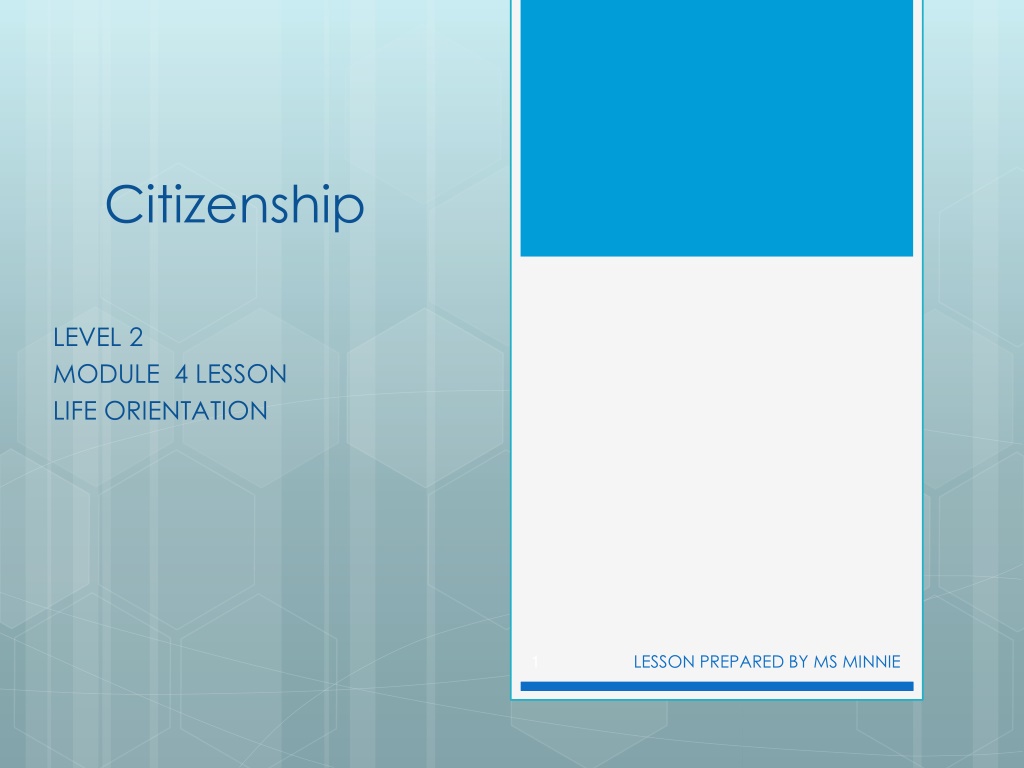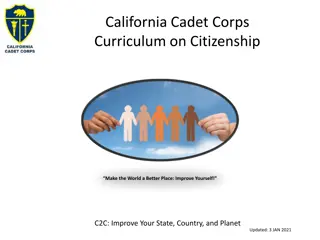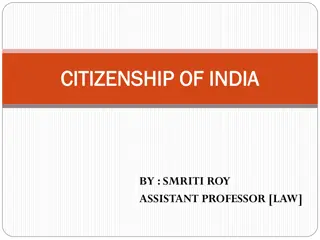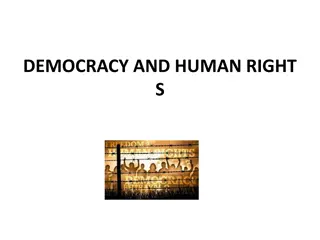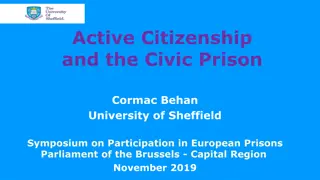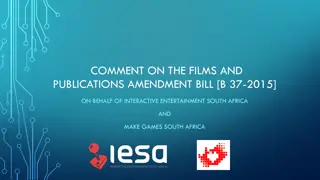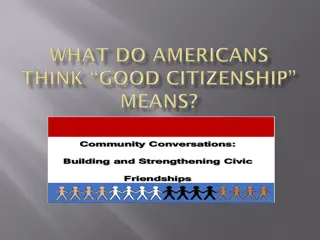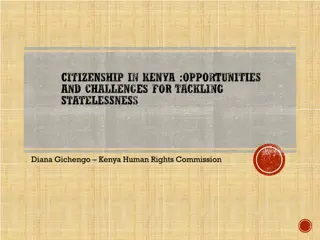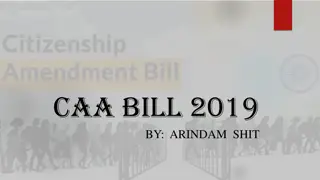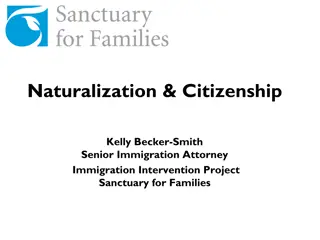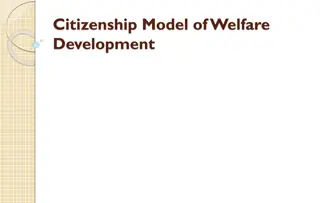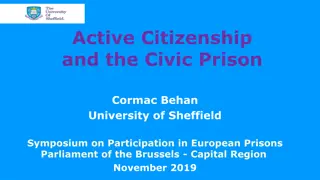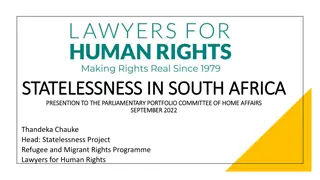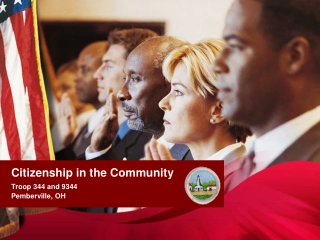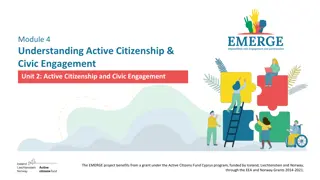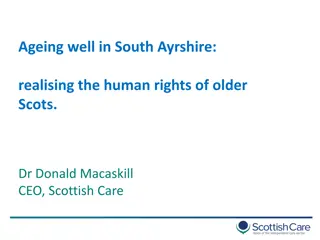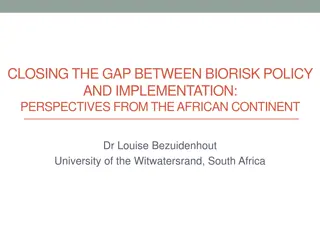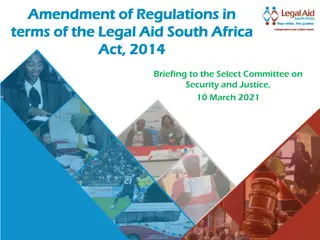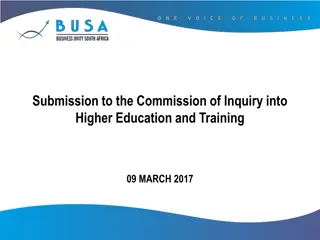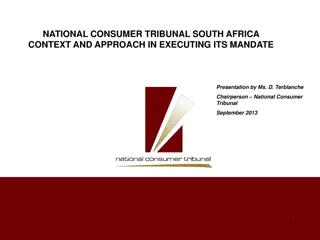Understanding Citizenship Rights in South Africa
South Africa's Constitution guarantees various rights and freedoms to all citizens, ensuring equality, dignity, and protection. The Bill of Rights enshrines over 25 fundamental rights, emphasizing equality before the law and prohibiting unfair discrimination based on various grounds. The Constitution serves as the supreme law, guiding the government's actions and ensuring that citizens' rights are upheld. International documents, like those from the United Nations, further outline rights for specific groups, reinforcing the importance of equality and non-discrimination.
Download Presentation

Please find below an Image/Link to download the presentation.
The content on the website is provided AS IS for your information and personal use only. It may not be sold, licensed, or shared on other websites without obtaining consent from the author. Download presentation by click this link. If you encounter any issues during the download, it is possible that the publisher has removed the file from their server.
E N D
Presentation Transcript
Citizenship LEVEL 2 MODULE 4 LESSON LIFE ORIENTATION LESSON PREPARED BY MS MINNIE 1
2 SA Citizen rights LESSON PREPARED BY MS MINNIE
3 Citizen rights All South Africans have rights and freedom The Constitution of our country acknowledges the human rights The Constitution is an example of one of the most democratic constitutions in the world. LESSON PREPARED BY MS MINNIE
4 The Bill of Rights The Bill of Rights provides over 25 basic rights and freedoms to all people of South Africa and is based on the Universal Declaration of Human Rights. E.g. people have the right to be treated equally and with dignity To live in freedom and security and in a healthy environment. To exercise freedom of association and movement and the right to vote. LESSON PREPARED BY MS MINNIE
5 Citizen rights The Constitution is the supreme or highest law of South Africa. The President, the government and all the people of South Africa must follow it. It says what the structures of the government are and what powers these structures have. It also ensures that your rights are protected and sets up institutions to check that government does not abuse your rights. All other laws in the country must adhere to the Constitution. The Constitution does not replace any of these laws. Instead, it sets the standards, which they must follow. LESSON PREPARED BY MS MINNIE
6 The Constitution Parliament can usually change a written law if 50% of the members of Parliament who are present support the change. The constitution needs a much higher percentage to vote to agree to change. 66% of the members of Parliament must agree to changes. LESSON PREPARED BY MS MINNIE
7 The Bill of Rights In addition to the Bill of Rights, there is also international documents, which set out our rights for special groups. Most of these have been written by the United Nations. LESSON PREPARED BY MS MINNIE
8 The South African Bill of Rights Equality Everyone is equal before the law and has the right to equal protection and benefit of the law. Equality includes the full and equal enjoyment of all rights and freedoms. To promote the achievement of equality, legislative and other measures designed to protect or advance persons, or categories of persons, disadvantaged by unfair discrimination may be taken. The state may not unfairly discriminate directly or indirectly against anyone on one or more grounds, including race, gender, sex, pregnancy, marital status, ethnic or social origin, colour, sexual orientation, age, disability, religion, conscience, belief, culture, language and birth. LESSON PREPARED BY MS MINNIE
9 The South African Bill of Rights Equality No person may unfairly discriminate directly or indirectly against anyone on one or more grounds in terms of subsection (3). National legislation must be enacted to prevent or prohibit unfair discrimination. Discrimination on one or more of the grounds listed in subsection (3) is unfair unless it is established that the discrimination is fair. LESSON PREPARED BY MS MINNIE
10 The South African Bill of Rights Human dignity Everyone has inherent dignity and the right to have their dignity respected and protected. Life Everyone has the right to life. LESSON PREPARED BY MS MINNIE
11 The South African Bill of Rights Freedom of religion, belief and opinion Everyone has the right to freedom and security of the person, which includes the right (a) not to be deprived of freedom arbitrarily or without just cause; (b) not to be detained without trial; (c) to be free from all forms of violence from either public or private sources; (d) not to be tortured in any way; and (e) not to be treated or punished in a cruel, inhuman or degrading way. LESSON PREPARED BY MS MINNIE
12 The South African Bill of Rights Freedom and security of the person Everyone has the right to bodily and psychological integrity, which includes the right (a) to make decisions concerning reproduction; (b) to security in and control over their body; and (c) not to be subjected to medical or scientific experiments without their informed consent. LESSON PREPARED BY MS MINNIE
13 The South African Bill of Rights Slavery, servitude and forced labour No one may be subjected to slavery, servitude or forced labour. Privacy Everyone has the right to privacy, which includes the right not to have (a) their person or home searched; (b) their property searched; (c) their possessions seized; or (d) the privacy of their communications infringed. LESSON PREPARED BY MS MINNIE
14 The South African Bill of Rights Freedom of religion, belief and opinion Everyone has the right to freedom of conscience, religion, thought, belief and opinion. Religious observances may be conducted at state or state-aided institutions, provided that (a) those observances follow rules made by the appropriate public authorities; (b) they are conducted on an equitable basis; and (c) attendance at them is free and voluntary. LESSON PREPARED BY MS MINNIE
15 The South African Bill of Rights Freedom of religion, belief and opinion This section does not prevent legislation recognising (i) marriages concluded under any tradition, or a system of religious, personal or family law; or (ii) systems of personal and family law under any tradition, or adhered to by persons professing a particular religion. (b) Recognition in terms of paragraph (a) must be consistent with this section and the other provisions of the Constitution. LESSON PREPARED BY MS MINNIE
16 The South African Bill of Rights Freedom of expression Everyone has the right to freedom of expression, which includes (a) freedom of the press and other media; (b) freedom to receive or impart information or ideas; (c) freedom of artistic creativity; and (d) academic freedom and freedom of scientific research. LESSON PREPARED BY MS MINNIE
17 The South African Bill of Rights Freedom of expression The right in subsection (1) does not extend to (a) propaganda for war; (b) incitement of imminent violence; or (c) advocacy of hatred that is based on race, ethnicity, gender or religion, and that constitutes incitement to cause harm. LESSON PREPARED BY MS MINNIE
18 The South African Bill of Rights Assembly, demonstration, picket and petition Everyone has the right, peacefully and unarmed, to assemble, to demonstrate, to picket and to present petitions. Freedom of association Everyone has the right to freedom of association. LESSON PREPARED BY MS MINNIE
19 The South African Bill of Rights Political rights Every citizen is free to make political choices, which includes the right (a) to form a political party; (b) to participate in the activities of, or recruit members for, a political party; and (c) to campaign for a political party or cause. LESSON PREPARED BY MS MINNIE
20 The South African Bill of Rights Political rights Every citizen has the right to free, fair and regular elections for any legislative body established in terms of the Constitution. Every adult citizen has the right (a) to vote in elections for any legislative body established in terms of the Constitution, and to do so in secret; and (b) to stand for public office and, if elected, to hold office. LESSON PREPARED BY MS MINNIE
21 The South African Bill of Rights Citizenship No citizen may be deprived of citizenship. Freedom of movement and residence Everyone has the right to freedom of movement. Everyone has the right to leave the Republic. Every citizen has the right to enter, to remain in and to reside anywhere in, the Republic. Every citizen has the right to a passport. LESSON PREPARED BY MS MINNIE
22 The South African Bill of Rights Freedom of trade, occupation and profession Every citizen has the right to choose their trade, occupation or profession freely. The practice of a trade, occupation or profession may be regulated by law. Labour relations Everyone has the right to fair labour practices. Every worker has the right (a) to form and join a trade union; (b) to participate in the activities and programmes of a trade union; and (c) to strike. LESSON PREPARED BY MS MINNIE
23 The South African Bill of Rights Every employer has the right (a) to form and join an employers organisation; and (b) to participate in the activities and programmes of an employers organisation. Every trade union and every employers organisation has the right (a) to determine its own administration, programmes and activities; (b) to organise; and (c) to form and join a federation. LESSON PREPARED BY MS MINNIE
24 The South African Bill of Rights Every trade union, employers organisation and employer has the right to engage in collective bargaining. National legislation may be enacted to regulate collective bargaining. To the extent that the legislation may limit a right in this Chapter, the limitation must comply with section 36(1). National legislation may recognise union security arrangements contained in collective agreements. To the extent that the legislation may limit a right in this Chapter, the limitation must comply with section 36(1). LESSON PREPARED BY MS MINNIE
25 The South African Bill of Rights Environment Everyone has the right (a) to an environment that is not harmful to their health or wellbeing; and (b) to have the environment protected, for the benefit of present and future generations, through reasonable legislative and other measures that (i) prevent pollution and ecological degradation; (ii) promote conservation; and (iii) secure ecologically sustainable development and use of natural resources while promoting justifiable economic and social development. LESSON PREPARED BY MS MINNIE
26 The South African Bill of Rights Property No one may be deprived of property except in terms of law of general application, and no law may permit arbitrary deprivation of property. Property may be expropriated only in terms of law of general application (a) for a public purpose or in the public interest; and (b) subject to compensation, the amount of which and the time and manner of payment of which have either been agreed to by those affected or decided or approved by a court. LESSON PREPARED BY MS MINNIE
27 The South African Bill of Rights Property The amount of the compensation and the time and manner of payment must be just and equitable, reflecting an equitable balance between the public interest and the interests of those affected, having regard to all relevant circumstances, including (a) the current use of the property; (b) the history of the acquisition and use of the property; (c) the market value of the property; (d) the extent of direct state investment and subsidy in the acquisition and beneficial capital improvement of the property; and (e) the purpose of the expropriation. LESSON PREPARED BY MS MINNIE
28 The South African Bill of Rights For the purposes of this section (a) the public interest includes the nation s commitment to land reform, and to reforms to bring about equitable access to all South Africa s natural resources; and (b) property is not limited to land. The state must take reasonable legislative and other measures, within its available resources, to foster conditions which enable citizens to gain access to land on an equitable basis. A person or community whose tenure of land is legally insecure as a result of past racially discriminatory laws or practices is entitled, to the extent provided by an Act of Parliament, either to tenure which is legally secure or to comparable redress. LESSON PREPARED BY MS MINNIE
29 The South African Bill of Rights A person or community dispossessed of property after 19 June 1913 as a result of past racially discriminatory laws or practices is entitled, to the extent provided by an Act of Parliament, either to restitution of that property or to equitable redress. No provision of this section may impede the state from taking legislative and other measures to achieve land, water and related reform, in order to redress the results LESSON PREPARED BY MS MINNIE
30 The South African Bill of Rights of past racial discrimination, provided that any departure from the provisions of this section is in accordance with the provisions of section 36(1). (9) Parliament must enact the legislation referred to in subsection (6). LESSON PREPARED BY MS MINNIE
31 The South African Bill of Rights Housing Everyone has the right to have access to adequate housing. The state must take reasonable legislative and other measures, within its available resources, to achieve the progressive realisation of this right. No one may be evicted from their home, or have their home demolished, without an order of court made after considering all the relevant circumstances. No legislation may permit arbitrary evictions. LESSON PREPARED BY MS MINNIE
32 The South African Bill of Rights Health care, food, water and social security Everyone has the right to have access to (a) health care services, including reproductive health care; (b) sufficient food and water; and (c) social security, including, if they are unable to support themselves and their dependants, appropriate social assistance. The state must take reasonable legislative and other measures, within its available resources, to achieve the progressive realisation of each of these rights. No one may be refused emergency medical treatment. LESSON PREPARED BY MS MINNIE
33 The South African Bill of Rights Everyone has the right (a) to a basic education, including adult basic education; and (b) to further education, which the state, through reasonable measures, must make progressively available and accessible. Everyone has the right to receive education in the official language or languages of their choice in public educational institutions where that education is reasonably practicable. In order to ensure the effective access to, and implementation of, this right, the state must consider all reasonable educational alternatives, including single medium institutions, taking into account (a) equity; (b) practicability; and (c) the need to redress the results of past racially discriminatory laws and practices. LESSON PREPARED BY MS MINNIE
34 The South African Bill of Rights Everyone has the right to establish and maintain, at their own expense, independent educational institutions that (a) do not discriminate on the basis of race; (b) are registered with the state; and (c) maintain standards that are not inferior to standards at comparable public educational institutions. Subsection (3) does not preclude state subsidies for independent educational institutions. LESSON PREPARED BY MS MINNIE
35 The South African Bill of Rights Language and culture Everyone has the right to use the language and to participate in the cultural life of their choice, but no one exercising these rights may do so in a manner inconsistent with any provision of the Bill of Rights. Cultural, religious and linguistic communities Persons belonging to a cultural, religious or linguistic community may not be denied the right, with other members of that community (a) to enjoy their culture, practise their religion and use their language; and (b) to form, join and maintain cultural, religious and linguistic associations and other organs of civil society. The rights in subsection (1) may not be exercised in a manner inconsistent with any provision of the Bill of Rights. LESSON PREPARED BY MS MINNIE
36 The South African Bill of Rights Access to information Everyone has the right of access to (a) any information held by the state; and (b) any information that is held by another person and that is required for the exercise or protection of any rights. National legislation must be enacted to give effect to this right, and may provide for reasonable measures to alleviate the administrativeand financial burden on the state. LESSON PREPARED BY MS MINNIE
37 The South African Bill of Rights Just administrative action (1) Everyone has the right to administrative action that is lawful, reasonable and procedurally fair. (2) Everyone whose rights have been adversely affected by administrative action has the right to be given written reasons. LESSON PREPARED BY MS MINNIE
38 The South African Bill of Rights National legislation must be enacted to give effect to these rights, and must provide for the review of administrative action by a court or, where appropriate, an independent and impartial tribunal; impose a duty on the state to give effect to the rights in subsections (1) and (2); and (c) promote an efficient administration. LESSON PREPARED BY MS MINNIE
39 The South African Bill of Rights Access to courts Everyone has the right to have any dispute that can be resolved by the application of law decided in a fair public hearing before a court or, where appropriate, another independent and impartial tribunal or forum. LESSON PREPARED BY MS MINNIE
40 The South African Bill of Rights Arrested, detained and accused persons Everyone who is arrested for allegedly committing an offence has the right (a) to remain silent; (b) to be informed promptly (i) of the right to remain silent; and (ii) of the consequences of not remaining silent; (c) not to be compelled to make any confession or admission that could be used in evidence against that person; LESSON PREPARED BY MS MINNIE
41 The South African Bill of Rights (d) to be brought before a court as soon as reasonably possible, but not later than (i) 48 hours after the arrest; or (ii) the end of the first court day after the expiry of the 48 hours, if the 48 hours expire outside ordinary court hours or on a day which is not an ordinary court day; (e) at the first court appearance after being arrested, to be charged or to be informed of the reason for the detention to continue, or to be released; and (f) to be released from detention if the interests of justice permit, subject to reasonable conditions. Everyone who is detained, including every sentenced prisoner, has the right (a) to be informed promptly of the reason for being detained; (b) to choose, and to consult with, a legal practitioner, and to be informed of this right promptly; LESSON PREPARED BY MS MINNIE
42 The South African Bill of Rights Chapter 2: Bill of Rights to have a legal practitioner assigned to the detained person by the state and at state expense, if substantial injustice would otherwise result, and to be informed of this right promptly; d) to challenge the lawfulness of the detention in person before a court and, if the detention is unlawful, to be released; (e) to conditions of detention that are consistent with human dignity, including at least exercise and the provision, at state expense, of adequate accommodation, nutrition, reading material and medical treatment; and (f) to communicate with, and be visited by, that person s (i) spouse or partner; (ii) next of kin; (iii) chosen religious counsellor; and (iv) chosen medical practitioner. LESSON PREPARED BY MS MINNIE
43 The South African Bill of Rights Every accused person has a right to a fair trial, which includes the right (a) to be informed of the charge with sufficient detail to answer it; (b) to have adequate time and facilities to prepare a defence; (c) to a public trial before an ordinary court; (d) to have their trial begin and conclude without unreasonable delay; (e) to be present when being tried; (f) to choose, and be represented by, a legal practitioner, and to be informed of this right promptly; (g) to have a legal practitioner assigned to the accused person by the state and at state expense, if substantial injustice would otherwise result, and to be informed of this right promptly; (h) to be presumed innocent, to remain silent, and not to testify during the proceedings; (i) to adduce and challenge evidence; LESSON PREPARED BY MS MINNIE
44 The South African Bill of Rights Every accused person has a right to a fair trial, which includes the right (j) not to be compelled to give self-incriminating evidence; (k) to be tried in a language that the accused person understands or, if that is not practicable, to have the proceedings interpreted in that language; (l) not to be convicted for an act or omission that was not an offence under either national or international law at the time it was committed or omitted; (m) not to be tried for an offence in respect of an act or omission to the benefit of the least severe of the prescribed punishments if the prescribed punishment for the offence has been changed between the time that the offence was committed and the time of sentencing; and LESSON PREPARED BY MS MINNIE
45 The South African Bill of Rights Every accused person has a right to a fair trial, which includes the right (o) of appeal to, or review by, a higher court. Whenever this section requires information to be given to a person, that information must be given in a language that the person understands. Evidence obtained in a manner that violates any right in the Bill of Rights must be excluded if the admission of that evidence would render the trial unfair or otherwise be detrimental to the administration of justice. LESSON PREPARED BY MS MINNIE
46 The right citizen This is someone who is the ideal citizen. Someone who make a difference in the lives of others. It can even be someone who treats others with dignity and respect. LESSON PREPARED BY MS MINNIE
47 The right college environment Respect life and renew your bond with nature Improve on your environmental awareness and knowledge Reduce, reuse and recycle Start educating friends and family about the environment Support local environmental initiatives and groups Use your rights as citizens and consumers. LESSON PREPARED BY MS MINNIE
48 Do the right thing Morals and ethics should encourage us to do the right things. Good, positive morals and values will assist you to make a success out of life. Ethical and moral codes includes values such as honesty, trust, integrity, courtesy and respect for authority. Values are the principles that guide your ethical and moral behaviour. LESSON PREPARED BY MS MINNIE
49 Volunteering the right thing to do! The value of volunteering cannot be measured in words. Becoming a volunteer is a selfless act It sets an example and makes a difference in someone's life. Volunteering has an impact on the individual and the community. LESSON PREPARED BY MS MINNIE
